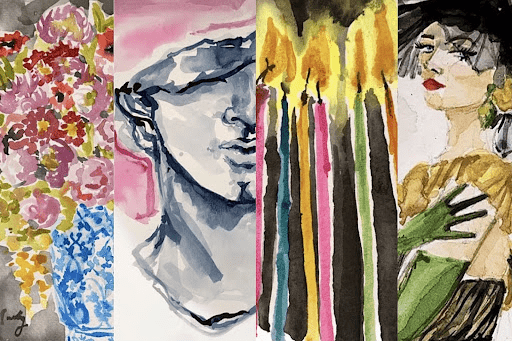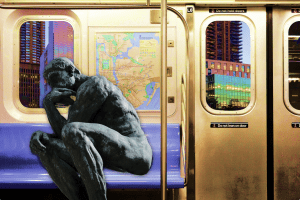Instagram’s Starving Artist: Facing Our Hunger for Attention
Sincere self-promotion on Instagram shouldn’t have to be embarrassing

Although I’m conditioned to be embarrassed by putting my artwork out there and getting little in return, there’s a little pride that I find in putting I made out there for others to see.
October 23, 2021
My most perpetual source of voluntary embarrassment is an Instagram account with 220 followers and 34 posts. It’s linked to an Etsy shop ranked with five stars — based on a whopping four reviews, two of which are from relatives. I post my watercolors on this account. It makes my skin crawl.
My Insta-insecurity does not stem from the quality of my artwork; in fact, I’m proud of most of the pieces I choose to share. It’s the act of begging the social media void for attention, validation and, sometimes, money that causes me to dread hitting “post.” I wince at the voice my captions take on, parroting the artists whose accounts have jump-started exhibition contracts, advertising gigs and careers. I can’t help but resent how unabashedly hungry I sound.
Ironically, I am far less self-critical about the content I share on my so-called “personal” Instagram account. It seems illogical that I should be less embarrassed to share a photo of myself, wildly overdressed for brunch in a faux leopard jacket, than the painting of the classical Three Graces statue at the Met which took me six hours to finish. The difference? The brunch post can get away with a witty-cool-girl-caption and bank on enough “hype” from semi-obligated friends to make it socially acceptable. The blatantly self-promotional voice and slew of hashtags on the painting posts expose me.
The content on my art account admits to the fact that I really want people to notice what I’m doing. I want strangers to stumble upon my work and be captivated. I want people to buy my prints. I want enough external validation to assure me that I should keep chasing my artistic aspirations. I want attention. And I’m not supposed to say that.
Social media is a game, and it’s uncomfortable to acknowledge head-on that we’re playing it. Every Instagram post is seeking some form of validation (my brunch shot included). Yet, paradoxically, we are judged on the socials based on how well we can veil that hunger for attention. Nonchalance is in vogue. Self-promotion (or, at least, self-promotion unaccompanied by self-loathing) is nearly impossible in a virtual world where tryhards and “pick-me’s” are condemned.
The pressure our generation feels from Instagram has been quietly accepted for years. Today, it’s making headlines. Facebook whistleblower Frances Haugen released thousands of pages of confidential company files, revealing that Facebook was withholding evidence that its product, Instagram, is actively harmful to teen girls. Haugen pointed mainly to Instagram’s role in promoting body image issues and eating disorders. But, the app exercises power over its users’ self-image in many aspects of life. A Pew survey found that 43% of young people on Instagram only post content that they feel “makes them look good to others,” and 37% only post content on which they anticipate receiving a high volume of likes and comments.
The less effort you appear to have put into your posts, the better — so long as they look enough like grittily glamorous freeze frames from coming-of-age films.
As a member of the 71% of 18- to 29-year-old Americans who use the app daily, I have felt the pressures of its unwritten, unattainable code of conduct. Your freedom to acceptably express yourself increases with your level of influence, but us regular people must constantly check ourselves against the app’s arbitrary standards: pretty, but not showy; aesthetic, but not posed; funny, but not too loud; and avoiding “cringey” at all costs. It’s exhausting.
The less effort you appear to have put into your posts, the better — so long as they look enough like grittily glamorous freeze frames from coming-of-age films. Popular “photo dumps” were intended to bring authenticity and spontaneity back to our posts. Yet, we spend hours curating them, editing and reordering our photos until they strike the chord of polished effortlessness. If you don’t include a funny or self-deprecating slide-over with the picture of you thriving, you’re taking yourself too seriously. The movement to “make Instagram casual again” has only reinforced this nonsensical pressure — “casual” goes against the very nature of social media itself. Moreover, it deters us completely from using social media to showcase that in which we take pride.
When did self-promotion become only acceptable beneath layers of irony? So many personal accounts are devoid of the passions that drive us for fear that we might look too hungry. We all want to look like pretty people living pretty lives who don’t expect anyone to tell us how pretty it all is, when, in reality, our phones are full of nearly identical rejected takes and we delight in refreshing our comment sections.
No matter how effortless our pages appear, we’re all fighting like hell for our personal brands behind our usernames. What’s so bad about admitting that?
I’m not advocating that we all caption our fit checks “tell me how good I look today” in the interest of transparency. But, we also shouldn’t let the standard of cool indifference deter us from showing the world what we have worked hard for and are proud of.
Do we really want to subscribe to a social code that labels passion as “cringe?”
There may be little we can do about the wave of self-consciousness that crashes over us when we post anything that may characterize us as vulnerable, ambitious or hungry. But, if nothing else, we can begin to question these arbitrary feelings and the unrealistic standards that have normalized them.
Do we really want to subscribe to a social code that labels passion as “cringe?” The world will still turn if our poetry posts, singing reels and art accounts flop. We can try again tomorrow. At the very least, we’ll have the satisfaction of knowing that our vulnerability is helping to dismantle the suffocating standards that prevent Instagram from being a vehicle for individuality, authenticity and support.
On an app that hypocritically shames attention-seeking, I’m hoping to get discovered. Although I’m conditioned to be mortified by putting my artwork out there and getting little in return, there’s a scintilla of pride to be found for advocating for myself out in the open. Here’s my painting. I worked hard on it. I put it here so you’d look. Justify my embarrassment? Here’s the link.












